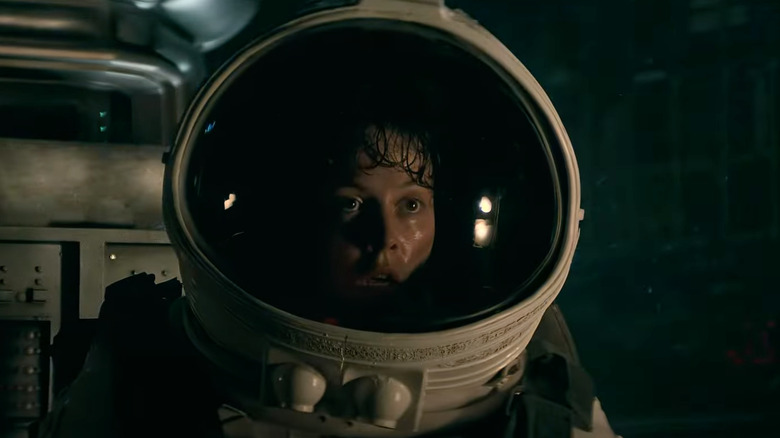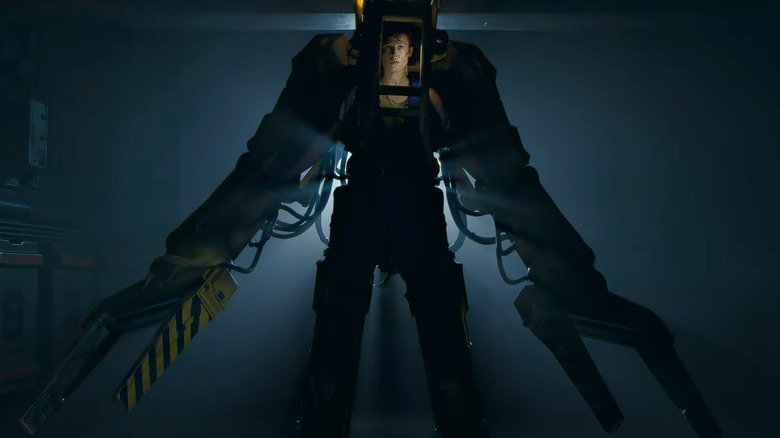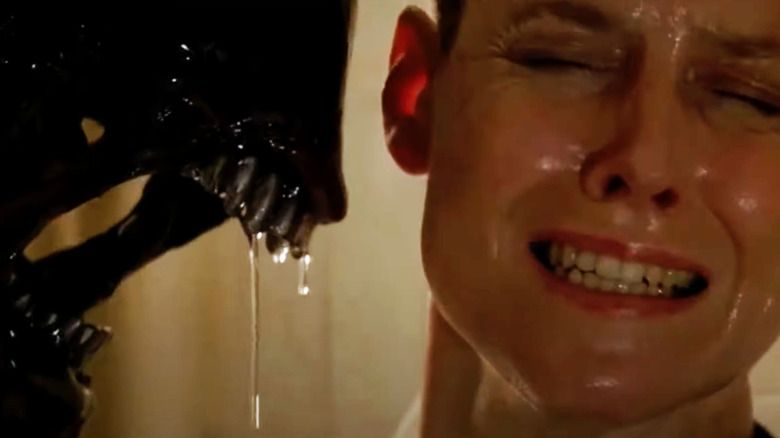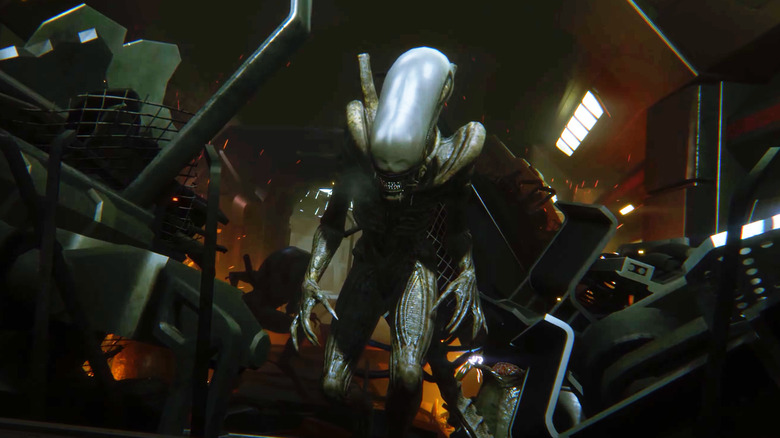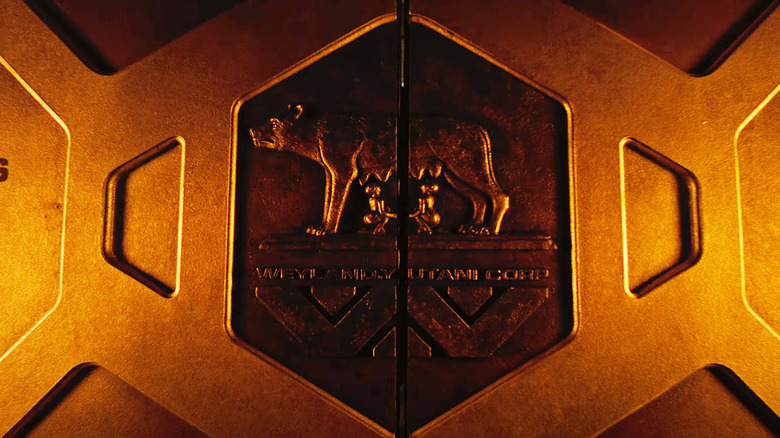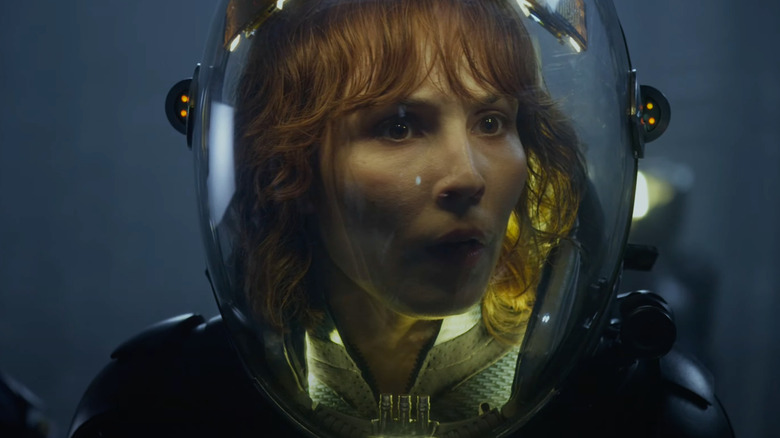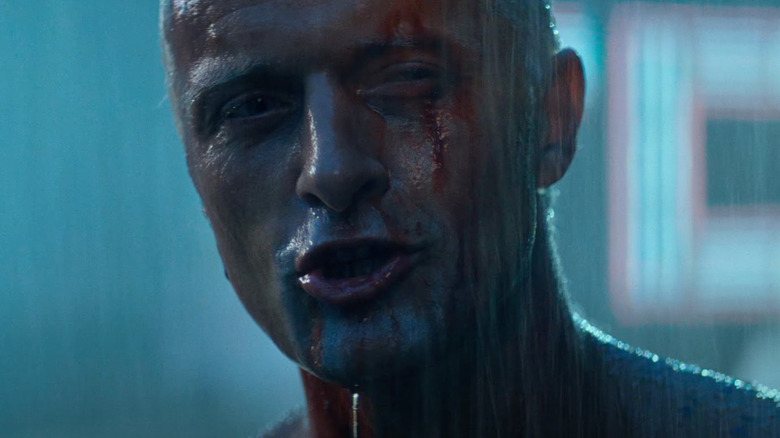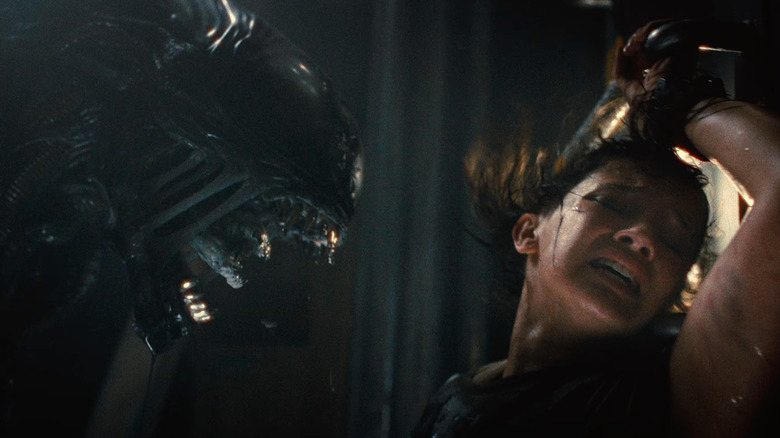The Only Recap You Need Before Alien: Romulus
"Alien" fans, rejoice! The long-running franchise is coming back in a big way, thanks to director Fede Álvarez's anticipated "Alien: Romulus," set for release on August 16, 2024. The latest chapter in the sci-fi series takes place in 2142, 20 years after the events of Ridley Scott's "Alien" and 37 years before James Cameron's "Aliens," and follows an all-new crew of hapless victims as they battle the ferocious, acid-spewing Xenomorph creature. After seven films and who knows how many books, comics, and video games, you'd think humans would've learned their lesson by now. Then again, their ongoing stupidity leads to our entertainment, right?
Starring Cailee Spaeny, Isabela Merced, Aileen Wu, Spike Fearn, and David Jonsson, "Romulus," judging by the trailers, brings back the sheer horror of the first movie and borrows plenty of cues from previous pictures. As such, viewers should brush up on their "Alien" lore to ensure they aren't lost when the blood-soaked carnage kicks off. We've got you covered with a recap of the franchise, featuring essential details that will prepare you for the shock and awe of Álvarez's film.
For those who don't have 20 hours to view the entire saga in the next few weeks, or are merely in need of a quick refresh, grab your flamethrowers and read the only recap you need before "Alien: Romulus" — it's the only way to be sure.
Alien (1979)
First and foremost, if you have yet to feast your eyes on Ridley Scott's horrifying masterpiece, "Alien," please stop reading, head to your nearest television, flip on your streaming platform of choice, and let the good times roll. No one should walk into "Romulus" without viewing this jaw-dropping piece of cinema, the one that started it all.
From a storytelling perspective, "Alien" keeps things simple. Think "Jaws" in space, albeit with an eight-foot extra-terrestrial that bleeds acid, blends with its environment, and transforms them into hosts quickly-evolving xenomorphs capable of breeding more gnarly baddies, though you'll only see some of that in scenes that got axed from the theatrical cut. Ultimately, the alien sneaks aboard a commercial spacecraft called the USCSS Nostromo and spends the next 24 hours stalking and killing the ship's seven-member crew until only one remains — Ellen Ripley, the badass protagonist played by Sigourney Weaver.
Ripley destroys the Nostromo only to meet the deadly creature on the escape craft, leading to a terrifying confrontation that ends when our brave heroine blasts it to outer space. Rumors abound that the Xenomorph in "Alien," dubbed "Big Chap," may appear in "Romulus." Does the film's ill-fated crew stumble upon its corpse floating through space? Can the alien survive without oxygen and heat? I guess we'll find out soon enough.
Aliens (1986)
"Alien" may be the best entry in the franchise, but "Aliens" stands as my favorite of the bunch. James Cameron's action-packed follow-up remains one of the best sequels ever made and a thrilling action classic in its own right. Picking up 57 years after Ridley Scott's film, "Aliens" follows Sigourney Weaver's Ellen Ripley back to LV-426, the moon where the crew of the Nostromo first encountered the Xenomorph. Except, this time, our tough-as-nails heroine arrives with plenty of firepower, specifically a raucous band of Colonial Marines armed with state-of-the-art weaponry and harsh language.
The problem is that a human terraforming colony called Hadley's Hope discovered the derelict spacecraft housing thousands of eggs, resulting in a massive alien force. Ripley must descend into the darkness once more to protect others, especially a young girl named Newt (Carrie Henn), ultimately coming to blows with an Xenomorph Queen.
Uniquely, Cameron's take presents the Xenomorphs as insect-like creatures more akin to bees than an advanced alien race. This approach destroys much of the mystery established by Scott in the original film, but it suits the sequel's Vietnam-inspired concept. Álvarez told Empire that "Romulus" merges "Alien" with "Aliens." Does that mean we'll see multiple Xenomorphs, pulse rifles, and an all-new Queen?
The other Alien sequels (and books)
"Aliens" marked the last great chapter in the "Alien" franchise. Nearly 40 years later, Fox has yet to produce a commendable continuation, miring its cash cow with controversial sequels like David Fincher's "Alien 3," and those silly "Alien Vs. Predator" pictures. Needless to say, while I'm inclined to agree with writer Chris Evangelista's take that there has never been a bad "Alien" movie — even the ridiculous "Alien: Resurrection" warrants a look — none of the sequels/prequels live up to the incredibly high bar established by the first two films.
Tellingly, the bookshelf is the best place to look for high-quality "Alien" content. Indeed, novels like Scott Sigler's "Aliens: Phalanx," Tim Lebbon's "Alien: Out of the Shadows," and Alex White's "Alien: The Cold Forge" add unique wrinkles to the lore. These stories often appear as audio dramas with sound effects, voice actors, and score. Together, they form a harrowing narrative that adds to and even enhances the film franchise. Christopher Golden's "Alien: River of Pain," for example, focuses on the Hadley's Hope colony, while "Aliens: Original Sin," by Michael Jan Friedman, picks up directly after "Alien: Resurrection."
If that weren't enough, you could always turn to the Dark Horse comic book series that leans heavily on the Colonial Marines angle established in "Aliens." Heck, Marvel has already announced a prequel tie-in comic for "Alien: Romulus," which presumably sheds light on some of the film's key mysteries. Happy reading!
Alien: Isolation (2014)
In 2014, Creative Assembly unleashed "Alien: Isolation" for video game consoles and instantly achieved immortal glory thanks to its incredible visuals, compelling story, and terrifying gameplay. The first-person survival horror game captures the essence of Ridley Scott's original film better than any of its big-screen counterparts, delivering the claustrophobic chills that made "Alien" an unforgettable experience.
Set 15 years after "Alien," and thus five years before "Romulus," "Isolation" allows gamers to step into the shoes of Ellen Ripley's daughter Amanda as she deals with a Xenomorph on the Sevastopol space station near LV-426, all while investigating her mother's sudden disappearance. Initially, a single alien stalks Amanda, but she later stumbles upon a nest similar to the one seen in James Cameron's sequel. Her journey leads to Sevastopol's destruction, and we last see Amanda floating through space, though a brief shot of flashing lights (not to mention her appearance via a deleted scene in "Aliens") suggests she survived the encounter.
Apparently, "Alien: Isolation" is an enormous inspiration for "Romulus." Don't believe me? Head over to Fede Álvarez's Twitter account for a sneak peek at some of the film's Easter Eggs, notably an Emergency Call Station resembling the devices players use to save their game in "Isolation." As a fan of this terrific video game, August 16 cannot come fast enough.
Weyland-Yutani Corporation
A unique aspect of the "Alien" series is the constant presence of the mysterious Weyland-Yutani Corporation, an overarching villain hellbent on acquiring the Xenomorph for military purposes. Per "Alien" lore, "The Company" is a multinational conglomerate consisting of Weyland Corp (founded by Sir Peter Weyland) and Yutani Corporation. Together, the two powerhouses manufacture androids, spaceships, and computer technology and contribute mightily to space exploration. Unfortunately, they are also prone to putting their interests ahead of their subordinates and seemingly threaten humanity more than the deadly alien organism.
In "Alien," The Company sends Ripley's crew to investigate the derelict spacecraft on LV-426, knowing they will encounter a specimen. In fact, they program Ash (Ian Holm) the android to ensure safe passage for the alien, even at the expense of his shipmates, under "Special Order 937." In "Aliens," Carter Burke (Paul Reiser) directs the Hadley Hope colonists to the same derelict spacecraft at the behest of Weyland-Yutani, leading to the deadly outbreak — all for a goddamn percentage.
Luckily, this evil corporation has not achieved its goals, but they have gotten remarkably close. How will they figure into the "Romulus" story? We do see the Weyland-Yutani logo in the trailers. Perhaps they send our new crew members to investigate a deserted space station, hoping for another stab at collecting their great prize.
Prometheus and the black goo
Ridley Scott produced "Romulus," so some of the ideas presented in his divisive prequels, "Prometheus" and "Alien: Covenant," might make their way into the new film. That's not necessarily a bad thing either. "Prometheus," for all its flaws, is one of the boldest science fiction movies in recent memory, even if the picture makes the critical mistake of over-explaining its lore. Remember the mysterious Space Jockey from the original "Alien" movie? Well, "Prometheus" uses this plot element to craft a wild backstory about Engineers, giant albino humanoids responsible for giving life to Earth. Thousands of years later, however, they decide to eliminate their creation, presumably due to our hubris, and manufacture a biological weapon to start life over on Earth.
Scott and writers Jon Spaihts, David Lindelof, and Dan O'Bannon never fully reveal the Xenomorph's origin but heavily infer that Engineers designed the necessary ingredients — a strange black goo — required to bring them to life. Michael Fassbender's android, David, then unlocks the formula, creates the perfect organism, and uses it to unleash his wrath upon humanity. After destroying the crews from "Prometheus" and "Alien: Covenant," he gleefully ventures into the unknowns of space, meaning he could potentially pop up in "Romulus" to continue his dastardly assault.
Blade Runner could have a tie-in too
Another picture viewers should at least be aware of when watching "Romulus" is Ridley Scott's "Blade Runner." The 1982 sci-fi classic features a few Easter Eggs that heavily infer the futuristic society is the same one seen in "Alien." However, where Harrison Ford's Rick Deckard and Ryan Gosling's K in "Blade Runner 2049" spend their days hunting wayward replicants in 2019 and 2049 respectively, "Alien" deals with far more advanced androids capable of feeling empathy, hate, and even jealousy over a century later. David and Ash could be the terrifying answer to the questions about artificial intelligence in "Blade Runner."
Other fun clues link the two franchises too. Notably, Tom Skerritt's Dallas used to work for the Tyrell Corporation featured in "Blade Runner," and Weyland Corporation founder Peter Weyland (Guy Pierce) mentions Dr. Eldon Tyrell (Joe Turkel), a notable figure in "Blade Runner," as his mentor in a journal found among the special features on the "Prometheus" Blu-ray. Rutger Hauer's empathetic android Roy Batty's quest to meet his maker in "Blade Runner" matches David's mission in "Prometheus" and "Covenant," a unique through line that explains the latter's resolve to wipe out all life in the universe.
I'm curious to see if Álvarez continues Scott's exploration of A.I. with David Jonsson's android Andy in "Romulus." Is the character merely another tool controlled by Weyland-Yutani?
Alien: Earth and Romulus are coming
As stated in the intro, it's a great time to be an "Alien" fan. We are weeks away from "Romulus," and next year, Hulu will release the first season of Noah Hawley's TV series "Alien: Earth." We know little about the mysterious project, except that it takes place on Earth 30 years before "Alien" and, according to Deadline, revolves around "the emergence of the story's infamous Weyland-Yutani Corporation and the race between corporations to create new android life." Whether the series ties directly with "Romulus" remains to be seen, but thankfully, fans won't have to wait too long for more Xenomorph action.
As for "Romulus," everything I've seen so far gives me hope that Álvarez's film will reinvigorate the franchise. He wisely sticks with what worked before, including practical sets and creature effects, a straightforward storyline, and striving to make the Xenomorphs scary again. Check out this terrific breakdown of the final trailer, and then head over to Álvarez's Twitter account for some fantastic behind-the-scenes photos. The "Evil Dead" director appears to be on the right track. With any luck, he'll nail the landing and deliver a worthy sequel to "Alien" and "Aliens."
